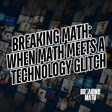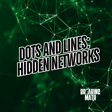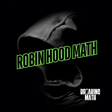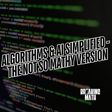Become a Creator today!Start creating today - Share your story with the world!
Start for free
00:00:00
00:00:01

75: Existential Physics with Sabine Hossenfelder (Author Interview)
An interview with Dr. Sabine Hossenfelder about her second book Existential Physics. Sabine is host of the famous youtube show Science with Sabine.
Transcript
Introduction and Sabina's New Book
00:00:05
Speaker
Sabina Hasenfelder is a physicist who breaks down concepts in physics on our YouTube channel and has recently written a book Existential Physics, which breaks down many obscure concepts in physics and discusses when unnecessary and confusing assumptions are often made. I'm Sophia, and this is Breaking Math, and with me I have on Sabina. Sabina, nice to have you on today.
00:00:25
Speaker
Hi, Sophia, good to talk to you. All right, so real quick, your YouTube channel. Do you want to plug that really quickly before we move on to your book? Yeah, sure. I have a YouTube channel, which is called Science Without the Gobbledygook. And I talk about, broadly speaking, everything that I'm interested in in science. But naturally, since I'm a physicist, I talk about physics a lot.
00:00:51
Speaker
Cool.
Motivation Behind 'Existential Physics'
00:00:52
Speaker
So what I guess drove you to write this book? I think the major reason I was writing this book is that I was kind of a little bit depressed really after my first book because really the first book is a community criticism. I'm pointing out what's going wrong in the foundations of physics. And a lot of the time when I come across headlines in the popular science media,
00:01:20
Speaker
that address problems in my own research area, then the only thing I do is to say, no, you can't do this. No, this is wrong. No, this doesn't work. So I come across as being terribly destructive, cynical, and it's kind of not how I want to be.
00:01:39
Speaker
So I wanted to say, yes, physics sometimes tells you there are things which you can't do. You can't send information faster than the speed of light, for example. You can't make negative mass, no matter what the headlines say. But it also tells you that some things are possible. And I collected some of those examples in my book that I hope are a little bit surprising, ideas that have come out of physics that tell you something big about the universe, which you might not have expected.
Quantum Experiments and Interpretations
00:02:08
Speaker
Well, cool. So real quick on the, on the whole front of, um, one of the videos that I, um, I first was, uh, became acquainted with, um, your channel and stuff through was the, um, the delayed quantum of razor experiment, which debunks a seeming, um, it debunks the fact that it seems like the past is erased. Um, and I feel like that kind of, um, do you want to talk about that and then dive into, um, some of the concepts in your book?
00:02:34
Speaker
Yeah, sure. So the quantum eraser experiment, this video came about because I was trying to understand this experiment. It was actually for a paper that I was working on. And I was looking up the literature on it. And I was also looking at the videos on YouTube, in the hope of getting an insight. And it just didn't make sense to me. I was I was trying to do the math. And I was writing down the equation that was like, I think those equations don't say what what the people on YouTube say.
00:03:03
Speaker
they mean. And so this is why I ended up doing the video. So basically, what one does in the quantum eraser experiment is that one starts out with the double slit experiment. So in the double slit experiment, it has this peculiar property
00:03:21
Speaker
that if you send individual photons onto the double slit, then they can interfere with themselves. So you see an interference pattern which builds up from the individual photons on the screen.
00:03:37
Speaker
But if you try to measure which of the two slits the photon went through, then the interference pattern vanishes. And what one does in the quantum eraser experiment is that instead of using only one
Can the Universe Think?
00:03:54
Speaker
photon, one creates an entangled pair of photons. And on the one side, for the one
00:04:02
Speaker
particle in the entangled pair, one does the double slit experiment and for the other one, one does a complicated other measurement. And then to make a long story short, the idea is that you can somehow erase the information about which slit the photon went through after you've already measured it. So that seems pretty mind bending, because it seems like first you go and measure
00:04:31
Speaker
which slit the photon went through. So you should have destroyed the interference pattern. But then when you measure on one of the entangled photons of the pair, what happens, then you can somehow recover this interference pattern. And so this is why people say you can kind of erase what you've already done.
00:04:52
Speaker
So at the time that you had released the quantum eraser video, at the end, you say that no one seems to be explaining this interpretation of the quantum eraser experiment, except for I can't remember who you mentioned at the end of the video, but you said you could trust them on the quantum side. It was referring to a blog post from Sean Carroll.
00:05:13
Speaker
which i only found after i'd done the video after i'd written the script and everything and someone pointed out look he's written about this here. Gotcha and so the way that you reinterpreted it seems like you just kind of you take information that is unnecessary out which is like your whole style right?
00:05:35
Speaker
Yes. So what I'm trying to say in the video is that to understand the quantum eraser, you don't have to do anything to the past. What you basically do when you take those photons by the slit that they came through, you're creating groups of photons which you can later use to sample them into sets
00:06:03
Speaker
each of which will give you an interference pattern. But if you combine them, you don't get an interference pattern because the maxima and minima of the two sets, they are complements to each other. So if you combine them, then you get what you actually observe in the double slit experiment if you know which slit the photon went through. So it all fits together.
00:06:29
Speaker
Interesting. Oh, yeah, it did that that makes some total sense to me especially because I remember reading books on quantum physics and stuff from when I was a kid that didn't explain what Measurement was that it was a physical process. They kind of made it seem like you know, I
00:06:47
Speaker
There's this other world of observation and stuff like that, which of course to anybody who'd studied physics for a few years would be pretty clear, but to somebody who's unacquainted with physics, like a kid studying just a book on physics, these confusing concepts can wedge their way into your mind in specific ways. Let's move on to your book. What I guess is your favorite chapter or a chapter you want to talk about the most?
00:07:14
Speaker
Merle Well, of course, I liked them all. You know, it's like it's like asking me which which of your children is your favorite one? What am I supposed to answer to this? I think for me, the most surprising one has been the one about the question whether the universe can think because I totally expected the answer to be no. But it didn't quite work out the way I wanted it to.
00:07:43
Speaker
interesting. Do you want to go into some of that? Yeah, so there is a standard argument that physicists make about why the universe can't think. And maybe I should step back a bit and explain why you
00:08:00
Speaker
may consider that the universe can think to begin with. It's because if you look at the distribution of galaxies from a really far distance in one of the galaxy surveys that have been made, then you'll find that the galaxies are distributed
00:08:19
Speaker
in filaments with clusters and it kind of superficially looks a little bit like the connectome of the human brain where you have neurons connected by axons and so on.
00:08:35
Speaker
So that brings up the question like if we have this structure in the human brain and it seems to be kind of similar to the universe, then maybe the universe can also think. Unfortunately, if you go only by the physics that we know and like already, the answer is no. And to make a long story short, the reason is that the universe is just too big.
00:08:59
Speaker
And we know that the speed of light is finite, and the universe is some tenths of billions of light years from one side to the other. So it takes a long time to send a signal from one side to the other. So even if the universe was thinking, it can't think very much.
00:09:19
Speaker
So this is kind of related to the concept of speed in neurons, like in the axons, correct? What is it? Cerebral neurons have a speed of something like 300 meters per second. The skull is something like 20 centimeters across. So what is that, a frequency of something like 250 hertz?
00:09:44
Speaker
neuron could go to the back and forth what of right of the mind so but so what you're saying is like for the universe for thick for the universe to be able to coordinate all its thoughts with one another it would need a very extended that's
Quantum Gravity and Locality
00:09:59
Speaker
right and we're talking more than trillions of
00:10:02
Speaker
years, but the universe has only been around for about 14 billion years. And it has an additional problem, which is that it's expanding and the expansion is actually speeding up, which makes it more difficult to communicate from one side to the other because the galaxies are moving apart from each other. So from here on, it's just going downhills.
00:10:30
Speaker
So the problem is basically that the speed of light is finite, and even though it's very large compared to the speed by which our brain sends around signals, it doesn't make up for the huge size of the universe.
00:10:48
Speaker
Okay, so this is for what standard physics is concerned, so to speak. But I've been working for a long time on quantum gravity. So this is the missing combination between quantum mechanics and gravity, which we're still working on. And one of the things that has come out of this line of research is that our notion of locality might not quite be correct.
00:11:18
Speaker
What do I mean by locality? What we mean by locality in physics is that if you want to interact with something, loosely speaking, it has to be nearby. If you want to send a parcel, it has to go some way from the sender to the receiver. It can't just disappear into a portal and suddenly reappear somewhere else.
00:11:40
Speaker
that's something which we don't observe. And we're pretty sure it doesn't exist, at least at the sizes that we have been able to look at. And that goes down to elementary particles. In the most extreme case, it's being tested at the Large Hadron Collider, and it's about
00:11:59
Speaker
10 to the minus 20 meters or something is the typical distance which they test there. But if you go to even shorter distances, something like 10 to the minus five centimeters, this is where you reach the Planck scale, then it's far less clear what is with this notion of locality. And there are some people who have suggested that actually if you go down to this very short distance scales, then there should be
00:12:28
Speaker
basically teeny tiny wormholes that would be connecting the universe one end to the other everywhere. And there would be a lot of those connections. And now let me be clear, those are so small that we can't go through them and even the elementary particles can't go through them, but they would still connect the geometry of the universe with itself.
00:12:53
Speaker
And it seems almost like knitting the tangent bundles and stuff like that in just the geometry of the space-time kind of. It's not the tangent bundle. I mean, if you want it to be differentiable, you have to make sure that the tangent bundle supports the differentiable geometry. But most of the time, people treat those
00:13:20
Speaker
It's called a non-local link as something which just doesn't fit to the geometry. If you want to make it more sophisticated, then I guess you would have to change the topology of the space-time.
00:13:33
Speaker
Yeah. But normally the way that people think about it is that the entire universe is just a big network that on those large scales that we observe approximate
00:13:51
Speaker
manifold to good accuracy. This is why we can, in Einstein's theory, use four-dimensional Riemannian differentiable manifold. But really, if you look at short distance scales, then you have all those non-geometric, non-local connections.
00:14:09
Speaker
And so this seeming need that you need to be close to something to interact with it might just disappear if you go to very, very short distance scales. And it's something that the universe might be able to do.
00:14:26
Speaker
And this is something which we just can't rule out based on everything we know right now, because we don't actually know what this theory of quantum gravity looks like. There are other reasons that people have put forward why this notion of locality that we currently use might not be entirely correct. The black hole information problem is one of them. Then there's quantum mechanics, the measurement problem. You already alluded to this.
00:14:54
Speaker
So there are a number of reasons why the locality that we observe seems a little bit suspicious. And this is why I think it's possible that down there at those very short distance scales, the universe is actually much more connected than it appears to us.
00:15:14
Speaker
Now, does this mean that the universe can think? Well, not necessarily, but it would probably mean that it has enough connections to do at least as much thinking as the human brain. I'm still trying to figure out what to make of this.
00:15:29
Speaker
Interesting. That is fascinating. So you just talked about these wormholes being so small that even elementary particles couldn't go through. So would this mean that if this neural structure did exist and these were the connections between them, that whatever thoughts this neural structure had would be inaccessible to us, basically?
00:15:53
Speaker
Well, we actually do measure the properties of space-time, for example, when we measure gravitational waves. So gravitational waves are not themselves particles made of matter, it's also not radiation. Instead, what we measure is we measure the influence of those space-time perturbations on the normal matter.
00:16:16
Speaker
So in principle, if you want to stretch your mind, it's possible in principle that there be some configurations of those non-localings that might become observable. If they cluster enough, basically, you could see an influence of this on the normal matter that we have. But to be fair, we don't really know a terrible lot about them.
00:16:42
Speaker
Interesting, and what kind of influence, do you want to go into what kind of influence, you know, that you're talking about specifically? Well, it's all speculation. So let me be clear, there's absolutely no evidence that this is correct. But I mean, there are some people who have argued that such non-local connections could actually have an effect quite similar to dark matter in the sense that
00:17:10
Speaker
those non-local links would basically multiply and distribute the gravitational influence of a mass. So if you think about some kind of meta-clamp, like a star, something that creates a gravitational field,
00:17:27
Speaker
And you have those non-local connections that start close by the thing, but they connect it to a different place that might be very, very far away from the star. Then at this far away place, you would now feel the stronger gravitational feed from close by the star.
00:17:45
Speaker
So the effect of the distribution of those non-local links could be that the gravitational attraction of some kind of source doesn't fall off as quickly as general relativity would predict. And that's pretty much exactly what we see when we look at galaxies or galaxy clusters, which is normally attributed to dark matter.
00:18:07
Speaker
So now, this sounds kind of good at first sight, so to speak. But if you think about it a little deeper, then you're really just replacing the distribution of dark matter with the distribution of those non-local links. And in the end, you don't really gain anything. It doesn't really help you with anything. And it brings in some new problems. So I'm not terribly excited about it.
00:18:35
Speaker
but it's certainly something that people have put forward. I myself wrote a paper about this, I don't know, 10 years ago, so I can hardly remember what's in the paper, but I was trying to address the possibility that energy can diffuse through those non-local links. That would basically have the fact that particles would lose energy as they travel. You see some kind of slowing down of
00:19:03
Speaker
highly energetic particles, and this is something which you can look for. It's not been seen, but those are some possible effects. Interesting. It seems all very strange when you get to that kind of... I mean, it's almost like a cliche at this point to say that it's strange when large and small scales interact, but it kind of just reminds me also of
00:19:28
Speaker
the stress-energy tensor. The stress-energy tensor being a combination of, for our audience, the energy density at a point or shear force or pressure in any specific plane. And it's a four by four tensor, and it's used in the Einstein general theory of gravitation. It always struck me that, you know, at the smallest scales, you have these atoms bouncing off of one another, which really creates the basis for pressure. But yeah, just
00:19:56
Speaker
just to add on and say that I think it's that all sounds very fascinating. So now let's move on from so that was perhaps the most surprising chapter. And is it unless it's the same answer. Do you have a chapter that you did that was perhaps the most technically difficult to get through?
00:20:16
Speaker
Definitely the first one. The first chapter is the one about the question whether the past still exists. This is a standard argument which you find in pretty much all textbooks on special relativity, but it's really hard to explain without writing down equations.
00:20:39
Speaker
And I've tried to do it mostly in words so that you'd still be able to follow it in the audio version, but I heavily rely on space-time diagrams and I hope it kind of came across. But this was definitely challenging.
00:20:58
Speaker
I can maybe add something to the stress energy tensor since you mentioned this. This is actually the way that it works with those non-local sources. You change the influence of the stress energy tensor. You spread it out basically.
00:21:13
Speaker
And actually, it's quite interesting that you brought up the question like what's with the elementary particles. Normally, the stress energy tensor that we use in general relativity is considered to be a kind of an average. It's not really something about the elementary particles. And as you certainly know, Einstein's field equations are nonlinear.
00:21:33
Speaker
So taking an average of the source isn't quite as trivial as it sounds. So strictly speaking, we're not even sure that we're solving the right equations when we're doing cosmology.
00:21:43
Speaker
That's kind of fascinating in its own right. Cosmology seems kind of fascinating too. Here's a question that perhaps you'd be able to answer just speaking of this sort of cosmology. I've looked at diagrams of the past. They have these different epochs that have different rates of expansion, right?
00:22:08
Speaker
I've always wondered, let me see if I can phrase this. Is it possible that it's a smooth expansion that's been distorted at points in some strange way? You mean when you cross over from one epoch to another?
00:22:24
Speaker
Yes, when you cross over from one ebook to another. I guess one thing I should say is that in general activity, you are free to choose your time coordinate. So technically, there are infinitely many choices of time coordinates that you could make. None of them is really any better or worse than the other. Often,
00:22:47
Speaker
the time coordinate that physicists choose is what's called the co-moving
Cosmology and Time Coordinates
00:22:52
Speaker
time. That means it moves with the matter, so it's like the proper time of the matter. But of course, if you're doing cosmology, you're talking about a homogeneous distribution of matter in the entire universe, which is of course not strictly speaking correct.
00:23:10
Speaker
And if you do this, then you have those rather artificial looking sudden transitions from one epoch to another when matter takes over radiation or inflation stops or something like this. But if you were to look at this more realistically with inhomogeneities, then those transitions would smooth out.
00:23:35
Speaker
interesting um yeah i always find that i always find that fascinating um i feel like when you're dealing with um speed of light kind of stuff in a doubly so cosmology you have that kind of like effect where like almost like the subject matter is slipping away from you as you study it i get the same feelings when i've studied um the fluid dynamics equations a few times
00:23:57
Speaker
So I guess I want to ask you too, is there anything about your specific background that led you to, you told a little bit about the factors that led you to write your previous book and how the experience from that led you to write this book, but is there anything from your career specifically, either be it an event or
00:24:19
Speaker
a general progression that led you to be fascinated and I guess these kind of questions of, I guess would you call that scientific ontology? Yeah, I guess it's because, so I originally didn't study physics, I studied mathematics.
00:24:36
Speaker
And I did this for like three, four years or something, but I really love mathematics. The problem was I loved all of it. It was all great. But then you come to a point where you have to make a decision, like which mathematics do you focus on?
00:24:55
Speaker
And I decided I would focus on that part of mathematics, which was good to describe nature, and that naturally led me into physics. But I've always been fascinated by the question, how much of nature can we describe
00:25:13
Speaker
by mathematics? How much can it do for us? And you find this in several places in my new book. So I partly wrote this book to remind myself of why I was interested in that question and why I find it so fascinating that physics can tell us all those things, which we in in in a very concrete way, pretty much deduce from mathematics.
00:25:39
Speaker
Yeah, we talk a little bit in our podcast, actually quite frequently in our podcast, and specifically we did episode four of our podcast about the interesting relationship between the physical world and the mathematical, I guess, realm. You have physical uses of math that aren't useful for much long after, but then sometimes you have discoveries in math.
00:26:02
Speaker
discoveries in physics which end up in mathematics or like lead to discoveries in mathematics. I mean you see this a ton with biology and computing to just give like I guess a middle ground type of example. It is fascinating too because I think I read somewhere about the incomputability of the three-body system given like a finite amount of space or something like that. I can't remember exactly what it was. Physics can be described by mathematics.
00:26:32
Speaker
So is there anything that leads you to believe that there are some physics that can't be described by mathematics? Because it seems to me that mathematics would be just a logical set of observations that you apply to other observations, I guess. And it seems like if those observations are consistent with any set of rules, then there would be some set of mathematics to explain them.
00:26:57
Speaker
Yes, this is a very common argument to make that if there's any kind of pattern that we observe, then there has to be mathematics to describe it. It's almost tautologically true, like the thing that we call a pattern that is already mathematics. I have absolutely no reason to think that there's any observation in nature, in general, not just in physics in particular, that cannot be described by mathematics.
00:27:24
Speaker
But I've entertained the thought, if it's possible to do science without mathematics and maybe somewhat disturbingly for you, I come to the conclusion you can conceivably do it. That's because if you think about it, what we do in many cases is that we use mathematics as kind of a middleman. We extract a pattern from one system, from our observations.
00:27:53
Speaker
And then we use another system. For example, it could be a computer, but it could also be a direct simulation. We use this other system to help us make a prediction for the first system. And in principle, you can take out mathematics as the middleman. You can just try to find two systems that kind of mimic each other, where one is simpler and helps you to make a prediction for the more complicated one. So I think you can do this.
00:28:23
Speaker
To some extent you could say we are already doing this in a research area that's called quantum simulation. So quantum simulations you can use fairly complicated condensed matter systems to try and mimic the behavior of elementary particles.
00:28:42
Speaker
Every once in a while, you see this in the headlines and the headline writers frequently get it wrong. They'll be talking about the discovery of some new kind of particle, but it's actually a particular excitation in some kind of material, so it's called a
00:28:58
Speaker
a quasi particle, not a fundamental particle, but on some level, mathematically, they behave the same way. So it's quite exciting. And, you know, you could think that maybe one day you could just use some custom design condensed matter system to actually simulate what's going on in an elementary particle collision and you don't actually need the mathematics in between.
00:29:24
Speaker
That reminds me of a short story that I read by Isaac Asimov or Arthur Z. Clarke, where there's a society far in the future where this person decides to write down a problem. It's like 35 times 73 and solves it on a chalkboard and everyone is amazed.
00:29:47
Speaker
because everybody's used to carrying these calculators around them and somebody asks, wait, is that true every time? And then at the end, they end up trying to use humans as guidance computers for missiles. It's some kind of political point that I forget exactly what it is. It's a very old story. But that is a fascinating idea.
Mathematics in Physics: Essential or Not?
00:30:06
Speaker
Especially it reminds me of a little bit of an experiment that I read from a few years ago where liquid helium
00:30:11
Speaker
was being used to study black holes, specifically like sound waves or something were being sent into swirls, eddies, something like that. Yeah, so that is fascinating and it even has the property of mathematics that mathematics is a simplification of the real world in many extents, you know? I mean, it's just that whole old argument of the platonic ideal versus whatever you want to call that.
00:30:35
Speaker
Yeah, the superfluidterium is actually an example of a quantum simulation. It's more specifically known as analog gravity. It's an analogy, not analog as opposed to digital. I mean, you could even make the argument that no mathematics has ever been used in physics if you wanted to get very strange in it.
00:30:55
Speaker
So for example, if we simulate the system like the same, we want to know what happens to a star under certain conditions, I don't know, some kind of physical experiment. We do it in a quantum simulation that simulates it with a high degree of precision. We're still going to have some opinions about this information. There had to be a reason why we came up with the information in the first place. This is just the way in which we use physics is just to explain it and that perhaps mathematics is our convoluted current way of explaining it.
00:31:23
Speaker
Yeah, I think that's one way to look at it, though I guess it's arguably true. For example, if you look at something that we would do in numerical general relativity, we put the whole thing on a computer and the computer solves some kind of differential equation.
00:31:44
Speaker
basically, but you could also look at the computer itself as a system that's just in some sense being mapped to the other system. I would still say that it's also mapped to some mathematical structure. The mathematics is there somehow, but the question is, do you actually need it?
00:32:06
Speaker
And then you could get even like more, like you've got further pedantic with it, I suppose, and then argue that, you know, the physicist or that the history of physics itself is the material that the mathematics is made of so that there's not actually a separation between the two in such a sense. But I feel like at that level, getting to almost fine grained.
00:32:31
Speaker
Yeah, I guess most physicists would kind of say it's the other way around. It's not that the math is made of the physics, but it's that the physics is made of the math, if that makes sense. But yeah, I mean, it gets very philosophical at this point, I suppose. So I'm kind of out of my depth there, I'm afraid. I guess we'll move on to
00:32:53
Speaker
Do copies of us exist? Yeah, sure.
Exploring Multiverses
00:32:57
Speaker
So the question whether copies of us exist comes up in this idea of the multiverse, which has been kind of popular in the foundations of physics in the past 1-2 decades.
00:33:09
Speaker
There are several different types of multiverses. Brian Green has written a book about it in which he lists nine, but I think I'll not go through the whole list. I'll just tell you the ones that you're most likely to have heard of. I guess the best known one is the Many Worlds interpretation of quantum mechanics. So normally, the way that quantum mechanics is taught to students, the story has it that
00:33:38
Speaker
In quantum mechanics, we predict probabilities for measurement outcomes. And we predict those by the use of what's called a wave function. So the wave function contains all those possibilities. For example, if you're measuring
00:33:54
Speaker
one particle just to keep things simple, and the particle either pops up on the left side of the screen or the right side of the screen, then the wave function might tell you, well, it's 50% left, 50% right. But then the moment you measure the particle, the probability jumps to 100 zero. And in the standard interpretation, you will then go and update the wave function. So it's called the update of the wave function, sometimes the reduction of the wave function or the collapse of the wave function, it's all the same thing.
00:34:24
Speaker
So now in the many worlds interpretation, the story has it that no, you don't update the wave function. Both of these measurement outcomes actually happen. But each of them happens in a separate universe. So in this case, you've split the universe into two.
00:34:41
Speaker
And this basically happens all the time and everywhere. Depending on how many possible outcomes an experiment has, you get more or less of those universes. That makes for a lot of universes very, very quickly.
00:34:58
Speaker
So that's the many words interpretation. There's also a specific theory for the beginning of our universe, which is called eternal inflation. In eternal inflation, our universe is created from a fluctuation in a quantum field.
00:35:17
Speaker
But the thing is that there isn't only one of those fluctuations that can make a universe. There are infinitely many, so they're constantly universes being created. So there are lots of other universes. And then to add a final one, it's the string theory landscape. So in this string theory landscape, there are different combinations of the fundamental constants of nature. So for each of them, you can have a different universe.
00:35:46
Speaker
And so what happens in those universes, like take for example the many worlds, so each time a quantum measurement happens or you make a quantum measurement, so quantum measurements don't actually need an apparatus that should have set this, you know, just if the particle hits a wall, this will also collapse the wave function or split the universe depending on which way you look at it.
00:36:16
Speaker
So now there are two versions of you, the one in which the particle hit the left side of the screen and another one in which it hit the right side of the screen. And in your brain, there are constantly quantum processes going on, and those could have different outcomes. And so every time you kind of make a decision in which a quantum process was involved,
00:36:37
Speaker
which we don't really know how much they are involved but it's just for the sake of the argument assume it is involved, then there are now several different versions of you and each of them has made a different decision and continues to live their life in a different way.
00:36:53
Speaker
And similarly in eternal inflation where you have all those different big banks, those universes, some of those elementary partings are tiny little bit different. So you're pretty much the same person that you're in this universe except that I don't know, there's a tiny little difference in your genetic code and that will lead you to choose a different profession. Maybe you're not making a podcast, I don't know, maybe you're into writing books or something like this.
00:37:21
Speaker
The problem with all those other universes that you have in the different versions of mighty verses is that we can't observe them. And it's not just that it's difficult, and we haven't yet been able to do it. It's impossible, even in principle. Like, for example, in the many words interpretation, the whole point about splitting the universe is that you don't see the other outcome of the experiment.
00:37:49
Speaker
So you don't measure it. So why do physicists believe that those other universes actually exist? Well, it's because they show up in their mathematics. So basically they say, well, I have this big piece of mathematics and some of what I see in my mathematics corresponds to what we actually do observe. Therefore, I deduce everything I see in my mathematics also has to exist.
00:38:15
Speaker
And it's this last step, which I think is not a particularly good conclusion. But if you want to, you can believe that those other universes exist. It's not that there are any observations that speak against their existence either.
00:38:31
Speaker
So I would say this is, as my friend Tim Palmer put it, an a scientific belief. If you want to, you can believe in those other universes with copies of you. But you shouldn't think that science actually delivers evidence for it. Interesting.
00:38:52
Speaker
So what led you, by the way, to start studying mathematics? You said you started with mathematics. Did you always have an interest in mathematics? Well, yeah, kind of. I was always good at maths. I think that's where I came from. My mother, I should say, she's now retired, but she was a high school teacher for maths and biology, I should probably add. So the physics didn't come from there.
00:39:21
Speaker
Oh, interesting. My mother was also both a math teacher and a biology teacher. All right, I guess a final question.
Meaning of Life Beyond Science
00:39:31
Speaker
Your epilogue, I love the title, What's the Purpose of Anything Anyway? I know it's epilogue, so it kind of summarizes the book. So it's probably not, not summarize the book, but you know, kind of is a closer to the book. But did you want to talk at all about that?
00:39:46
Speaker
Well, yeah, so in the epilogue, I try to put forward my own thoughts about what's the meaning of life? What's the purpose of anything anyway? And one of the points that I'm trying to get across is that I think it's not really a question that science can possibly answer. Meaning or purpose of our lives is something that everyone has to find for themselves.
00:40:14
Speaker
And if you ask me what I think the meaning of my life is, what's the purpose? I would put this into science communication, which makes a lot of sense to me. I explain to other people what I found in the foundations of physics, and that gives meaning to my life.
00:40:33
Speaker
I think it's a great thing that you as a physicist are putting that view forward. Existential Physics, A Scientist's Guide to Life's Biggest Questions, is a book that's all about what it says on the title and what we talked about today. I recommend that you all buy it. It's a very fun book. It's big enough to have you spend quite a bit of time on it, but not where it's either intimidating or
00:41:01
Speaker
So Sabina, any final remarks? No, that were really, really good questions. It's great to talk to you. Awesome. So yeah, check out her book. Check out her channel, Science Without the Gobbledygook. And keep listening to Breaking Math. We never know how to actually finish the show on this program. We just kind of let it end.



















